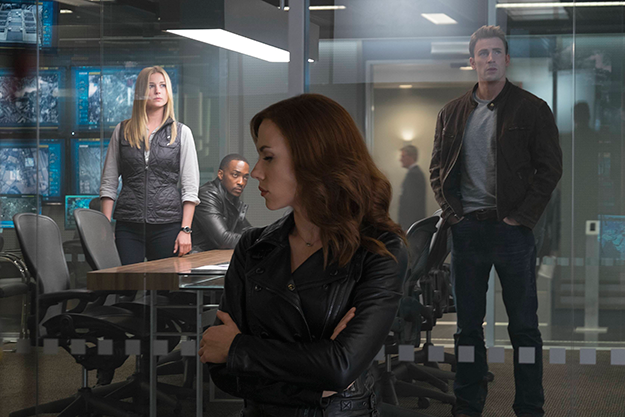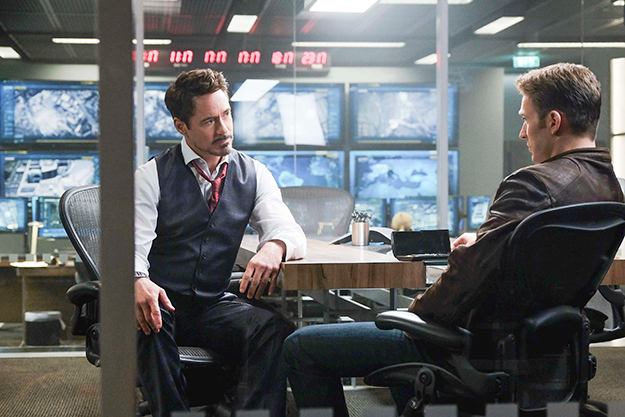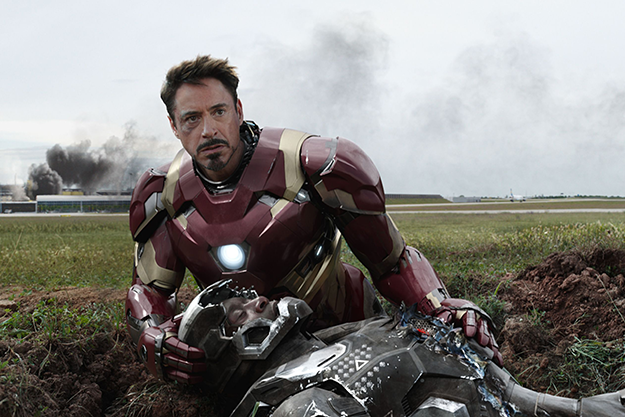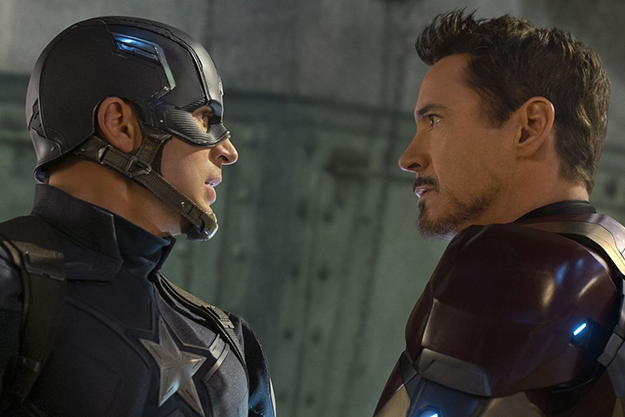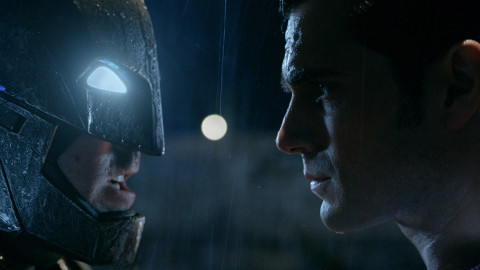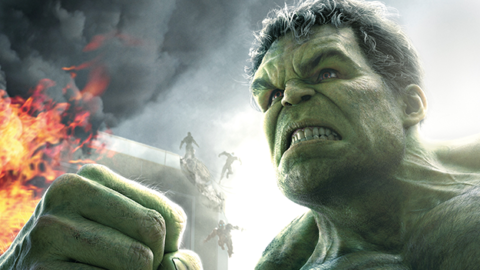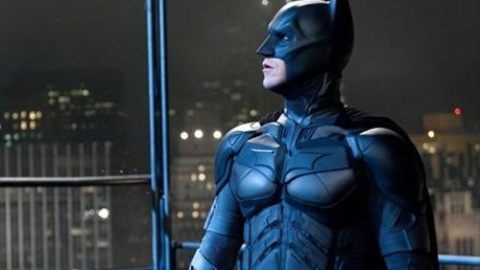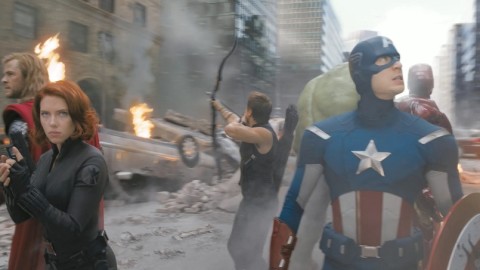Deep Focus: Captain America: Civil War
“United We Stand. Divided We Fall,” reads the poster art for Captain America: Civil War. I think the movie conveys a more pertinent and veracious feeling: “Even divided, we endure.” That’s downright Faulknerian for a comic-book movie, and not surprising for a Marvel production by the Russo Brothers, whose Captain America: The Winter Soldier was the film equivalent of a graphic-novel masterpiece. Civil War doesn’t reach that level, but it is solid, engrossing, and, in places, inspired. It fulfills the promise of the title and sometimes surpasses it with Brobdingnagian comedy and audacious mood swings.
In this film, Tony Stark / Iron Man, the Avengers’ resident mastermind, and Captain America / Steve Rogers, the team’s leader, split over the question of whether they should submit to United Nations oversight and regulation. Shellhead says yes; Winghead says no. Stark / Iron Man recognizes that scores of innocent lives have been lost to collateral damage while he and the rest of the Avengers have saved Earth from Armageddon (twice). He argues that unless superheroes accept supervision willingly, more stringent controls will be forced upon them. Rogers / Captain America counters that accepting the UN’s proposal is a moral and political lose-lose, shifting responsibility for lost lives from the Avengers to their supervisors while wresting control of the superheroes’ powers from their own hands.
For Joe and Anthony Russo and for screenwriters Christopher Markus and Stephen McFeely, no social ideal is morally and intellectually pure, which automatically makes this film more adult than most contemporary political commentary. Is Stark open to supervision because he’s come to doubt his own judgment? Iron Man has been mulling over the mysterious death of his parents, who died before he could reconcile with his father; he also has come to recognize that his egocentric workaholism has driven his beloved Pepper Potts away from him. So he feels vulnerable when he’s guilt-tripped by the mother of a promising young man killed during the apocalyptic fight between the Avengers and Ultron. (The always-potent Alfre Woodard plays the aggrieved mom.)
Rogers, for his part, ignores the UN plan partly because it would obstruct his ability to protect his former partner, Bucky Barnes / The Winter Soldier (Sebastian Stan), a recovering programmed assassin who may have set off a bomb at UN headquarters in Vienna.
As the tension between Stark and Rogers reaches breaking point, and their colleagues must choose a position, the men take sides out of loyalty or flattery. James Rhodes / War Machine (Don Cheadle), for example, stands by his Iron Man, while Sam Wilson / Falcon (Anthony Mackie) remains true to his Captain. The women are harder to pin down. Natasha Romanoff / Black Widow (Scarlett Johansson), for maybe the first time, agrees with Stark. She also reckons that Rogers’s friendship with Barnes, and his conviction that he can salvage him from brainwashing, has clouded his judgment. But Romanoff can still cut Rogers a break, even after push comes to shove. Wanda Maximoff / The Scarlet Witch (Elizabeth Olsen), feels guilt over catalyzing calls for Avenger supervision after her telekinetic powers cause a building to be bombed. She welcomes the soothing friendship of the synthezoid Vision (Paul Bettany), who sides with Stark, but she ultimately goes along with Clint Barton / Hawkeye (Jeremy Renner), her main Avengers mentor, who comes out of retirement to help Rogers.
The Russo Brothers don’t force the comic/dramatic friction among these characters—it emerges from the skill and personality of each actor. Downey is more dashing than ever in a role built around sardonic melancholy. Evans, a preternaturally square Captain America even when he goes rogue, makes a terrific foil for him, especially when Iron Man mutters, “Sometimes I want to punch you in your perfect teeth.” Actually, there isn’t a weak link in the cast. Olsen is alternately hyper-aware and moody as Maximoff, and as the Scarlet Witch she puts oomph behind her spell-casting, unlike what she did in Avengers: Age of Ultron, where she seemed to wield the sorcerer’s equivalent of jazz hands. Johansson is more fun to watch than anyone else mano to womano; she turns alertness and dexterity into super-powers as she practices an ultimate mix of martial arts, from extreme wrestling to parkour. One by one, the supporting players step to the plate and clean up, whether it’s William Hurt as the statesmanlike yet menacing Secretary of State Thaddeus Ross, Daniel Brühl as the haunted, enigmatic villain Helmut Zemo, or Martin Freeman as the smug counter-terrorism expert Everett K. Ross.
The film hews to clean, involving storytelling logic. The essential virtue of the Marvel Cinematic Universe is that, on its own terms, it generates credibility. The key Marvel films don’t just make you believe that men and women can fly in intricate suits or that individual super-soldiers and hit people can take down entire cities—they also make you believe in a world where it all makes sense. The sparkling special effects aren’t merely glitzy, sugary eye candy. You won’t hear a niftier piece of exposition than Vision’s formulation of the Avengers’ existential dilemma: “In the eight years since Tony Stark announced himself as Iron Man, the number of enhanced persons has grown exponentially. The number of potentially world-ending events has grown at a commiserative rate…. There may be causality. Our strength invites challenge. Challenge incites conflict. Conflict breeds catastrophe.” In this elegant argument for oversight, the use of “enhanced persons” as a PC euphemism for mutants or human lab experiments is particularly clever.
The filmmakers have embedded equal amounts of wit and purpose in the narrative, and that blend gives the film gravity—but without sobriety. The same goes for the action. In Civil War, when Captain America tells the Scarlet Witch “Let’s do this like we practiced,” it’s funny and thrilling to think that he can coax an out-of-control sorceress whose powers include telekinesis to try to become a commando. (Tragedy ensues because she’s not quite there yet.)
Along with hyper-precise staging, what distinguish the set pieces are tempi that range from allegretto to presto. The “civil war” that erupts among Avengers foments filmmaking invention, not anarchy. It harks back to a comic-book tradition that predates the Avengers. DC’s Justice League of America, the progenitor of Marvel’s team comics, often found intriguing ways to break its corps of costumed superstars into manageable mini-dramas before bringing them together for a big finish. In the midst of all this, the Russo Brothers manage to introduce a dynamite addition to the MCU: T’Challa, crown prince (and then king) of the secluded, super-advanced African nation of Wakanda, who dons a clawed, bullet-deflecting big-cat suit midway through and becomes Black Panther. Chadwick Boseman (42, Get On Up) plays him with exhilarating black heat and, later, hard-earned wisdom.
The showdown between Captain America’s team and Iron Man’s is marvelously entertaining, mostly because each side pulls in an offbeat ringer. Enlisted by Falcon, Scott Lang / Ant-Man (Paul Rudd) is so excited to be on Captain America’s team that he can’t restrain himself from feeling Rogers’s biceps. This unpredictable character’s presence and Rudd’s I-can’t-believe-I’m doing-this demeanor enable the Russos to pull off ingenious gags. One of Ant-Man’s tricks becomes the literal high point of the movie. On the other side, young Peter Parker / Spider-Man (Tom Holland) is so exuberant that he even infects the ultimate hardheads, Iron Man and War Machine, with his enthusiasm for reenacting a scene from The Empire Strikes Back.
The Russo Brothers can’t find an elating way to come down from those giddy heights; the film’s final fight sequence is relentless and anticlimactic. It is pleasurable, though, to spend time with these actors, even when they’re clobbering each other. And by the end, every flashback clicks together with a satisfying snap. Captain America: Civil War isn’t as original or sustained as the previous Captain America movie, but it does meet the challenge of every serialized adventure—it makes you hunger to find out what happens next.
Michael Sragow is a contributing editor to FILM COMMENT and writes its Deep Focus column. He is a member of the National Society of Film Critics and the Los Angeles Film Critics Association. He also curates “The Moviegoer” at the Library of America website.



